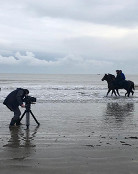Donn's Articles » Royal Ascot
Royal Ascot
Time flies. It is exactly 10 years since Dermot Weld took Irresistible Jewel to Royal Ascot for the Ribblesdale Stakes. Winner only of a Naas maiden before her royal engagement, under a typically cool Pat Smullen ride, the Moyglare Stud’s filly picked up impressively inside the final furlong of the 2002 Ribblesdale and got up to win by three parts of a length.
Last Thursday, on the 10th anniversary of Irresistible Jewel’s victory, Weld took that mare’s daughter, Princess Highway, to contest the same Ribblesdale Stakes. Same race, same Moyglare Stud silks, same rider. Same result.
In much the same way as the number of Irish-trained winners at the Cheltenham Festival is a crude barometer of the health of Irish National Hunt racing, so the number of Irish winners at Royal Ascot provides a similar measure for flat racing. It is not a coincidence that, at no Royal Ascot meeting during the recession-ravaged decade that linked 1985 and 1995 were there more than two Irish-trained winners, and in four of those years there were none.
Princess Highway was the sixth of eight Irish-trained victories at the 2012 Royal meeting, representing six different trainers. Prognosis: healthy.
The Cheltenham theme was very much in evidence in the Ascot Stakes on Tuesday and in the Queen Alexandra Stakes yesterday, not because Simenon bounded clear up the hill on the good to soft ground to win both contests easily, but because the Marju gelding is trained by Willie Mullins.
It isn’t often that you will find a Royal Ascot winner prepping for his date with The Queen by winning a two-mile hurdle at Cork by 15 lengths under Ruby Walsh, but that was the run that probably put Simenon spot on for Tuesday’s two-and-a-half-mile flat race.
Ruby Walsh is rarely replaced by anyone in the saddle, but he would probably have to lose a heavy limb to ride at 9st 10lb, and if you are going to be replaced by anyone, it might as well be Ryan Moore. “If he stays, he’ll probably win,” said a top-hatted Walsh beforehand, “and if he doesn’t, he’ll probably win the Ebor.” Simenon did stay and he did win, but that doesn’t mean he won’t win the Ebor, or the Doncaster Cup.
There can’t be many items left on Willie Mullins’s to-do list, but if ‘Train a Royal Ascot Winner’ was on that list, he can tick the box now. Twice. With his Royal Ascot breakthrough coming nine days after he won the French Champion Hurdle with Thousand Stars and two days after he won a six-furlong two-year-old maiden at Cork with Blue Bullet, there is no doubting the trainer’s versatility.
Jim Bolger also demonstrated his versatility when he sent out Dawn Approach to win the Coventry Stakes on Tuesday. Not only did Bolger prepare the two-year-old colt to run for his life in what was probably a hot Group 2 contest, but he also bred the youngster, and his wife Jackie owns him. And just to put the icing on top, Bolger also trained Dawn Approach’s Derby-winning sire New Approach.
The Coventry Stakes is an accurate pointer to the future these days, with three of the last five winners going on to win Classics. There is no telling how good Dawn Approach could be, and post-race quotes of 16/1 about him for next year’s 2000 Guineas appeared generous.
There are no quotes for any 2013 race about Wednesday’s Prince of Wales’s Stakes hero So You Think, simply because the likelihood is that he will be going into quarantine early next month after he races in the Eclipse at Sandown to prepare to take up stud duties in Australia for the 2012 season.
Trainer Aidan O’Brien is not one to embrace the limelight, puff out his chest and gather in all the accolades that are heaped upon him in the direct aftermath of a big-race win. The trainer is more apt to gather the laurels and hand them to the team. Yet, he was unusually self-deprecating even for himself after So You Think’s victory.
“It took me a year and a half to learn how to train him,” he said. “I was probably over-working him, galloping the speed out of him.”
The general feeling is that So You Think has not reached the dizzy heights since crossing the equator and registering at Ballydoyle that he had scaled when he raced in Australia under the tutelage of Bart Cummings, but the hard evidence suggests otherwise.
The son of High Chaparral won five Group 1 races in 17 months racing in Australia, he has now won five Group 1 races in Europe in 13 months. The highest Racing Post Rating that he recorded when with Cummings was 129, the exact same as the highest Racing Post Rating that he has recorded with O’Brien. Twice. The reality is that he is a top class racehorse who probably has neither improved nor regressed for leaving a master trainer in one hemisphere and joining a master trainer in another.
He may have been bred in New Zealand, he may have raced in Australia and he may be returning to Australia, but this week he is an Irish winner at Royal Ascot.
© The Sunday Times, 24th June 2012


 Follow Donn
Follow Donn